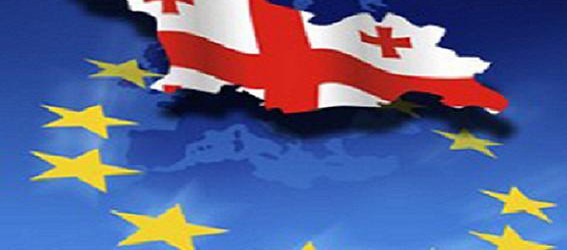The year 2013 was notable for Georgia due to two political events. Outcome of last year’s October presidential elections in translated into a complete establishment of the new political system. “Georgian Dream” emerged as a ruling party, with its candidate Georgi Margvelashvili claiming the presidential seat. Mikheil Saakashvili’s “United National Movement” moved to the opposition and its leader was compelled to flee to the U.S. to evade criminal persecution.
Another significant event was signing of the Association and Free Trade Agreement between the government of Georgia and the European Union on 29 November, 2013 in Vilnius. 1000 pages long agreement was signed by Georgia’s Deputy Foreign Minister David Zalkaliani who described the event as historic and the process of European integration as inadvertent.
At present, Georgia is a formal participant of the very process. It must be stressed that it is not the EU membership but rather political and economic association that we are talking about. Nonetheless, even this milestone came at a price for Georgia. For a past decade, the country unconditionally followed instructions of the European Union, and the U.S. in particular. This has necessitated drastic changes in the economic orientation. Russian market was sacrificed to the politics. Georgia created favorable conditions for foreign investors that led to eventual takeover of country’s valuable assets by the European businesses.
Despite unquestionable position of the Georgian government with respect to streamlining of domestic legislature with the European standards and implementation of all political and economic reforms requested by the EU, Brussels still has number of questions to be raised with the Georgian side. Regardless of being relatively ahead of other post-Soviet countries in terms of progress in fighting corruption, improvement of business climate and realization of other reforms, criticism by Georgia’s European partners targets termination of the activity of the anti-monopoly service, reforms on the new penal code and other areas.
Document agreed upon with the European Union still contains number of requirements that Georgia must comply with by the end of the year. Harmonization of legislature, political reforms, enhancement of judiciary to meet European standards, readmission arrangement, quality improvement of products bound for the European market, streamlining of self-administration and education, just to name the few. Complex procedural stages, seemingly endless conditions and requirements solidify skepticism and evoke questions.
First question is whether Georgia would ultimately become the full-fledged member of the European Union. According to ”Ukrainian Choice” social movement’s leader Viktor Medvedchuk, Georgia’s decade-long European integration example demonstrates how groundless the sacrifices of this country to meet EU requirements were. Previous demands paved the way for newer ones but Georgia failed to make it to the EU membership (see: На примере Грузии видна бесперспективность евоинтеграции – В.Медведчук / ”Unn.com.ua”, 28 August 2013).
If Georgia would not be geographically placed in Russia’s vicinity and along the energy resources transportation routes, the country could hardly capture EU’s attention, taken into account country’s size and distance from the continental Europe. On the other hand, it is the very geographic location that hampers Georgia’s EU membership. South Caucasus is in the vicinity of not only Russia but also of Iran and therefore, it is highly unlikely that in the short-run, the European Union is ready to expand its borders towards Iran and the Central Asia. Presumably, this explains the extent of stringency of requirements on the EU membership of the ”Eastern Partnership” states compared to ones pertaining to Baltic countries prior to their accession to the organization.
Second question that provokes skeptical conclusion is associated with Georgia’s political and economic prospects within the EU. According to the Leonid Savin, the leader of the ”Eurasian Movement”, the ”Eastern Partnership” is a policy aimed at boosting EU’s influence at the expense of former Soviet republics and retaining these territories under control, by employing legal and economic mechanisms. From the capitalist logic perspective, the ”Eastern Partnership” is nothing but a tool to gain new markets, resources and human capital. From a military point of view, Georgia’s involvement with NATO provides for transition to Western weapons systems that are exclusively manufactured by the North Atlantic Alliance member states (see: Леонид Савин. Иванишвили сразу же после победы заявил о стремлении Грузии в НАТО, а этот вопрос очень чувствителен и принципиален для Росии / ”Geworld.ge”, 29 October 2012).
On the other hand, not the most flourishing economic and social situation in the post-Soviet Baltic members of the EU provides little ground for optimism. For example, pensions for the elderly in Lithuania are just below 150-200 Euros, while consumer price are those of Germany’s. Some 400 thousand people in the country are food aid recipients, distributed by the Red Cross and other organizations. Foreign capital (especially in the banking sector) dominates in these countries.
In Latvia, Scandinavian banks own 80% share in the banking sector. Therefore, even the appointments of chiefs of division in the Finance Ministry of the country have to be confirmed by the Association of Latvian Commercial Banks. Top authority here belongs to foreign banks. Along with economic situation, the Baltic states are not thriving in social terms either. Some areas of Estonia are experiencing acute shortage of doctors, since the former choose to work in Finland where salary is 7-10 fold of theirs at home (see:Конференция ”Прибалтийский опыт евроатлантической интеграции: возможно ли повторение в Грузии?” / ”Georgiamonitor.org”, 21 November 2012).
Despite examples of the likes of Greece, Cyprus, and countries of the Balkans, Euro-skepticism within Georgia’s political elite isn’t salient. Outcome of country’s geopolitical choice is scrutinized neither by the political circles nor by the expert community. Idea of European Union membership has become almost an ideological guideline. Georgia resolutely strides towards the European Union. Nonetheless, it is difficult to predict the ending, in view of the rapid pace of geopolitical processes in the region.
Kaynak: Newtimes.az

























































